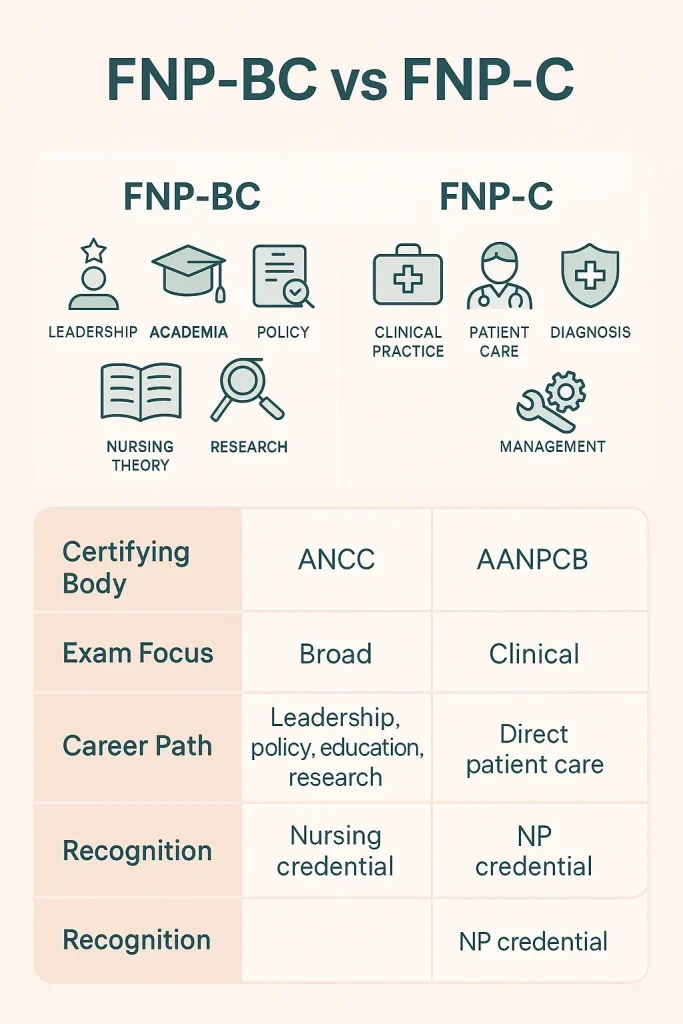Becoming a Family Nurse Practitioner (FNP) is a major career milestone for registered nurses (RNs) seeking to advance their clinical expertise or leadership roles. Choosing the right certification FNP-BC (Board Certified) or FNP-C (Certified)—can significantly impact your career path. This guide covers all the differences, eligibility requirements, exam details, career implications, and more to help you make an informed decision.


| Feature | FNP-BC | FNP-C |
| Certifying Body | ANCC | AANPCB |
| Exam Focus | Policy, research, nursing theory | Clinical practice |
| Exam Length | Longer | Shorter |
| Exam Cost | Higher | Lower |
| Career Path | Leadership, academia, policy | Clinical practice, direct patient care |
| Recognition | Highly respected | Highly respected |
Before applying, candidates must meet specific criteria:
MSN (Master of Science in Nursing) or DNP (Doctor of Nursing Practice)
Active RN license in the U.S.
Minimum clinical hours completed during FNP program (varies by certification)

~175 multiple-choice questions
3.5–4 hours
Nursing theory, policy, research, clinical decision-making
500/800 scale
Higher than FNP-C
~150 multiple-choice questions
3 hours
Clinical practice, patient care, diagnosis, management
500/800 scale
Lower than FNP-BC
This is why full chest recoil is non-negotiable. If you lean on the chest, you prevent the heart from refilling with blood. Compressing an empty heart generates zero blood flow.

Maintaining certification is crucial for career growth:
| Aspect | FNP-BC | FNP-C |
| Renewal Cycle | Every 5 years | Every 5 years |
| CEU Requirements | 75 contact hours | 100 CEUs with 25 in pharmacology |
| Process | Application + CEU documentation | Application + CEU documentation |
Both certifications are highly respected; FNP-BC may slightly lead in leadership roles while FNP-C aligns with clinical salary scales.

| Certification | Pros | Cons |
| FNP-BC | Ideal for leadership, academia; recognized nationwide | Higher exam cost; longer preparation |
| FNP-C | Focused on patient care; shorter exam; lower cost | Less emphasis on research or policy roles |
FNP-BC Certified
“chose FNP-BC and is now teaching at a nursing school while contributing to health policy initiatives.”
FNP-C Certified
pursued FNP-C and works as a primary care provider, seeing patients daily and focusing on clinical excellence.
Opportunities pediatrics, geriatrics, family care
Leadership and research positions for FNP-BC
Professional development through ANCC or AANPCB events
Clinical leadership roles for FNP-C
Choosing between FNP-BC and FNP-C depends on your career goals.
Assess your career trajectory, study requirements, and professional interests before making a decision.
Most MA hospitals now audit BLS status monthly. An expired card = immediate removal from patient care duties. Train with a DNP who has run real codes not someone reading off slides.
Or fill out our form → We respond within 5 minutes.

Jocelyne Destine provides high-quality healthcare training programs, including CNA, HHA, BLS, and MAP courses. With a focus on practical learning and flexible options, we prepare students for rewarding careers in healthcare. Join us to unlock your potential and make a difference.
© 2024 One Health Training Center and Beyond